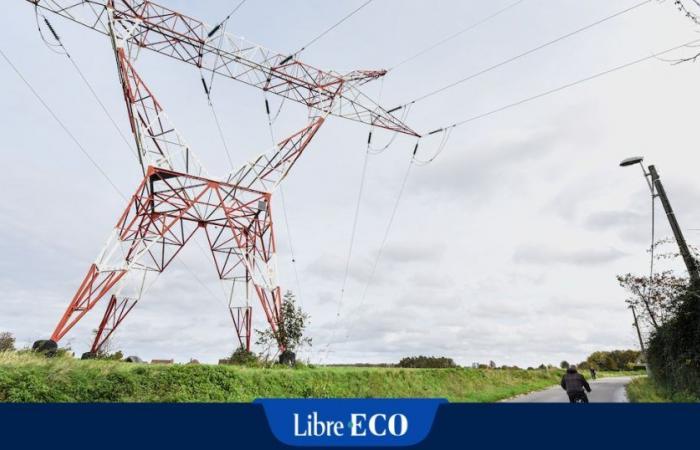Since mid-March, we have observed a “decoupling” of electricity prices between France, on one side, and its neighbors, on the other side (see infographic).
Last week, for example, electricity prices were half as high in France as in Belgium, on the wholesale markets. France was at 21 euros per MWh on average, compared to 49 euros in Belgium, 62 euros in the Netherlands and 63 euros in Germany.
However, in normal times, electricity prices are similar on the wholesale markets of these four countries, which belong to the same price zone. Indeed, electricity interconnections between these countries must allow prices to converge.
How, then, can we explain the lack of convergence since mid-March? You should know that France has produced a lot of electricity recently. Indeed, its nuclear fleet is working well, while renewable production (hydroelectricity, wind and photovoltaics) is also doing well. However, problems on the French electricity network have reduced France’s export capacities towards its eastern borders. So much so that France was unable to export all of its production surpluses, causing electricity prices to fall at home. On the other hand, Belgium, Germany and the Netherlands were unable to fully benefit from French exports, which pushed up prices at home.
On the side of Creg, the federal regulator of the energy sector, “we are monitoring the situation closely”. The Belgian regulator is in contact with its French counterpart, as well as with RTE, the French electricity network manager.
However, at this stage the situation could not be clarified. RTE had announced that France’s export capacities would be restored from May. But we see that electricity prices are, even today, much higher in Belgium than in France.
Is it always profitable to install solar panels? Wallonia launches a map to answer this question
If this situation concerns the Belgian regulator, the German regulator, for its part, said it was satisfied with the French management of events. Belgian industry, for its part, views the situation with concern. “I dare to hope that France does not voluntarily limit its export capacitiesexplains Peter Claes, director of Febeliec, the federation of large energy consumers. This situation is still not good for EDF, which could sell its electricity more expensively abroad than in France”.
Eric De Keuleneer, professor emeritus at the Solvay Brussels School, believes that we must ask ourselves whether France is not voluntarily limiting its exports, to support its industry via competitive electricity prices. He emphasizes that certain companies could choose France, rather than Belgium, to set up a production site. Remember that Dunkirk is in a fight with Ghent to attract an investment of one billion euros from ArcelorMittal.
Problems until the end of 2027?
According to Robbie Jackson-Stroud, analyst at the consultant ICIS, this situation could continue, to varying degrees, until the end of 2027. According to him, it is in 2026 that we could observe the most acute problems. Remember that by 2026, five out of seven nuclear reactors should have been disconnected from the Belgian electricity network. In addition, Doel 4 and Tihange 3, the two reactors extended by ten years, are supposed to be shut down between April 1, 2026 and November 2, 2026, to carry out the extension work. During this period of time, the Belgian nuclear fleet should therefore be completely shut down. Belgium will therefore rely on France for part of its electricity supply.
What if France’s export capacities are limited at that time? “If electricity flows are not supplied by France to Belgium, your country risks being affected by price peaks”, replies Robbie Jackson-Stroud. But this does not mean that we fear a shortage of electricity in our country. Indeed, according to this analyst, Belgium simply risks having to use more of its gas power plants, which would increase electricity prices here.
The reasons that explain the strong return of Russian gas to Europe
Furthermore, in the absence of price convergence, French industry would benefit from a competitive advantage for a longer period of time than expected.
According to the ICIS expert, things should start to calm down from the end of 2027. And, by 2030, there should be no more problems of this type. “There will be a replacement of nuclear capacity by wind and photovoltaic capacities in Belgium”, he declares. Thanks to this additional production capacity, Belgium would be less vulnerable to problems in France.
What impact for the consumer?
Prices in wholesale markets influence about 35% of a household’s electricity bill, called the energy component. A household pays around 300 euros per MWh for its electricity, all inclusive (energy component, transport, distribution, surcharges, taxes, etc.). The additional cost of 30 euros per MWh on the wholesale markets, between Belgium and France, therefore only represents around 10% of a household’s total bill.
On the other hand, certain industrialists, connected to the high voltage network, only pay 150 euros per MWh for their electricity, all inclusive. A difference of 30 euros per MWh is therefore more significant. Note that, according to the latest study, Belgian industry benefits from lower energy prices than its neighbors (see opposite).






